Người ta thường cứ phải xem những loại phim xã hội băng hoại tương lai (dystopia) để thấy rõ tính bạo ngược bất nhân của hệ thống nhà nước quyền chính và những giảo thuyết chính trị băng hoại, trong khi nó xảy ra hàng ngày trước mặt.
Pepe Escobar đến tận nơi đề thấy những cái “từ tâm” của bọn nhà nước hội đoàn Âu Mỹ LHQ chỉ là những tổ chức tay sai của quyền lực: không một bóng dáng những tổ chức chính qui nhân đạo quốc tế này có mặt để giúp đỡ dân chúng đang bị khủng bố bắn giết bởi chính nhà nước Ukraine của họ, ngoài trừ sự trợ giúp lương thực giới hạn của nhà nước Nga, cũng từng là nhà nước của họ.
Khi đối diện với một sự thật hãi hùng và ghê tởm, người ta không còn lời để nói, chữ để diễn đạt. Nhưng cuối cùng ký giả này cũng phải quát lên sự phẫn nộ bi hài:
“Cuối cùng, bọn chúng là “văn minh” phương Tây- đặt để xúi bẩy những tên hèn mạt mà chẳng bao giờ dám chường bộ mặt trang điểm của chúng để đối diện với người dân Donbass” Cho nên đây là quà tặng của tôi cho chúng. Chỉ là một tiếng hống phẫn nộ và sự khinh bỉ tận cùng. (After all, they are Western “civilization”-enabled cowards who would never dare to show their manicured faces to the people of Donbass. So this is my gift to them. Just a howl of anger and unbounded contempt)
2-4-2015
nkptc
nkptc
Pepe Escobar in Eastern Ukraine: Howling in Donetsk
By Pepe Escobar
Asia Times’ roving correspondent Pepe Escobar just returned from a reporting trip to the Donetsk People’s Republic (DPR), the pro-Russian enclave in the Donetsk Oblast province of eastern Ukraine. The area’s been the scene of heavy fighting between pro-Russian rebels and the Ukrainian military.
March 31, 2015 “ICH” – “Asia Times” – I’ve just been to the struggling Donetsk People’s Republic. Now I’m back in the splendid arrogance and insolence of NATOstan.
Quite a few people – in Donbass, in Moscow, and now in Europe – have asked me what struck me most about this visit.
I could start by paraphrasing Allen Ginsberg in Howl – “I saw the best minds of my generation destroyed by madness”.
But these were the Cold War mid-1950s. Now we’re in early 21st century Cold War 2.0 .
Thus what I saw were the ghastly side effects of the worst minds of my – and a subsequent – generation corroded by (war) madness.
I saw refugees on the Russian side of the border, mostly your average middle-class European family whose kids, when they first came to the shelter, would duck under tables when they heard a plane in the sky.
I saw the Dylan of Donetsk holed up in his lonely room in a veterans’ home turned refugee shelter fighting the blues and the hopelessness by singing songs of love and heroism.
Quite a few people – in Donbass, in Moscow, and now in Europe – have asked me what struck me most about this visit.
I could start by paraphrasing Allen Ginsberg in Howl – “I saw the best minds of my generation destroyed by madness”.
But these were the Cold War mid-1950s. Now we’re in early 21st century Cold War 2.0 .
Thus what I saw were the ghastly side effects of the worst minds of my – and a subsequent – generation corroded by (war) madness.
I saw refugees on the Russian side of the border, mostly your average middle-class European family whose kids, when they first came to the shelter, would duck under tables when they heard a plane in the sky.
I saw the Dylan of Donetsk holed up in his lonely room in a veterans’ home turned refugee shelter fighting the blues and the hopelessness by singing songs of love and heroism.
The Dylan of Donetsk
I saw whole families holed up in fully decorated Soviet-era bomb shelters too afraid to go out even by daylight, traumatized by the bombings orchestrated by Kiev’s “anti-terrorist operations”.
Soviet-era bomb shelter
I saw a modern, hard-working industrial city at least half-empty and partially destroyed but not bent, able to survive by their guts and guile with a little help from Russian humanitarian convoys.
I saw beautiful girls hangin’ out by Lenin’s statue in a central square lamenting their only shot at fun was family parties in each other’s houses because nightlife was dead and “we’re at war”.
I saw beautiful girls hangin’ out by Lenin’s statue in a central square lamenting their only shot at fun was family parties in each other’s houses because nightlife was dead and “we’re at war”.
Donetsk girls by Lenin’s statue
I saw virtually the whole neighborhood of Oktyabrski near the airport bombed out like Grozny and practically deserted except for a few lonely babushkas with nowhere to go and too proud to relinquish their family photos of World War II heroes.
Bombed out Oktyabrski neighborhood
I saw checkpoints like I was back in Baghdad during the Petraeus surge.
I saw the main trauma doctor at the key Donetsk hospital confirm there has been no Red Cross and no international humanitarian help to the people of Donetsk.
I saw the main trauma doctor at the key Donetsk hospital confirm there has been no Red Cross and no international humanitarian help to the people of Donetsk.

Oktyabrski neighborhood, bombed hospital
I saw Stanislava, one of DPR’s finest and an expert sniper, in charge of our security, cry when she laid a flower on the ground of a fierce battle in which her squad was under heavy fire, with twenty seriously wounded and one dead, and she was hit by shrapnel and survived.
I saw orthodox churches fully destroyed by Kiev’s bombing.
I saw the Russian flag still on top of the anti-Maidan building which is now the House of Government of the DPR.
I saw the gleaming Donbass arena, the home of Shaktar Donetsk and a UFO in a war-torn city, deserted and without a single soul in the fan area.
I saw Donetsk’s railway station bombed by Kiev’s goons.
I saw a homeless man screaming “Robert Plant!” and “Jimmy Page!” as I found out he was still in love with Led Zeppelin and kept his vinyl copies.
I saw a row of books which never surrendered behind the cracked windows of bombed out Oktyabrski.
I saw the fresh graves where the DPR buries their resistance heroes.
I saw the top of the hill at Saur-mogila which the DPR resistance lost and then reconquered, with a lone red-white-blue flag now waving in the wind.
I saw orthodox churches fully destroyed by Kiev’s bombing.
I saw the Russian flag still on top of the anti-Maidan building which is now the House of Government of the DPR.
I saw the gleaming Donbass arena, the home of Shaktar Donetsk and a UFO in a war-torn city, deserted and without a single soul in the fan area.
I saw Donetsk’s railway station bombed by Kiev’s goons.
I saw a homeless man screaming “Robert Plant!” and “Jimmy Page!” as I found out he was still in love with Led Zeppelin and kept his vinyl copies.
I saw a row of books which never surrendered behind the cracked windows of bombed out Oktyabrski.
I saw the fresh graves where the DPR buries their resistance heroes.
I saw the top of the hill at Saur-mogila which the DPR resistance lost and then reconquered, with a lone red-white-blue flag now waving in the wind.
Top of the hill at Saur-moglia
I saw the Superman rising from the destruction at Saur-mogila – the fallen statue in a monument to World War II heroes, which seventy years ago was fighting fascism and now has been hit, but not destroyed, by fascists.

The superman statue rising from the destruction at Saur-mogila
I saw the Debaltsevo cauldron in the distance and then I could fully appreciate, geographically, how DPR tactics surrounded and squeezed the demoralized Kiev fighters.
I saw the DPR’s military practicing their drills by the roadside from Donetsk to Lugansk.
I saw the DPR’s Foreign Minister hopeful there would be a political solution instead of war while admitting personally he dreams of a DPR as an independent nation.
I saw two badass Cossack commanders tell me in a horse-breeding farm in holy Cossack land that the real war has not even started.
I did not see the totally destroyed Donetsk airport because the DPR’s military were too concerned about our safety and would not grant us a permit while the airport was being hit – in defiance of Minsk 2; but I saw the destruction and the pile of Ukrainian army bodies on the mobile phone of a Serbian DPR resistance fighter.
I did not see, as Organization for Security and Co-operation in Europe international observers also didn’t, the rows and rows of Russian tanks and soldiers that the current Dr. Strangelove in charge of NATO, General Breedhate, sees everyday in his exalted dreams invading Ukraine over and over again.
And I did not see the arrogance, the ignorance, the shamelessness and the lies distorting those manicured faces in Kiev, Washington and Brussels while they insist, over and over again, that the entire population of Donbass, traumatized babushkas and children of all ages included, are nothing but “terra-rists”.
After all, they are Western “civilization”-enabled cowards who would never dare to show their manicured faces to the people of Donbass.
So this is my gift to them.
Just a howl of anger and unbounded contempt.
Copyright 2015 Asia Times. All rights reserved. http://www.atimes.com
I saw the DPR’s military practicing their drills by the roadside from Donetsk to Lugansk.
I saw the DPR’s Foreign Minister hopeful there would be a political solution instead of war while admitting personally he dreams of a DPR as an independent nation.
I saw two badass Cossack commanders tell me in a horse-breeding farm in holy Cossack land that the real war has not even started.
I did not see the totally destroyed Donetsk airport because the DPR’s military were too concerned about our safety and would not grant us a permit while the airport was being hit – in defiance of Minsk 2; but I saw the destruction and the pile of Ukrainian army bodies on the mobile phone of a Serbian DPR resistance fighter.
I did not see, as Organization for Security and Co-operation in Europe international observers also didn’t, the rows and rows of Russian tanks and soldiers that the current Dr. Strangelove in charge of NATO, General Breedhate, sees everyday in his exalted dreams invading Ukraine over and over again.
And I did not see the arrogance, the ignorance, the shamelessness and the lies distorting those manicured faces in Kiev, Washington and Brussels while they insist, over and over again, that the entire population of Donbass, traumatized babushkas and children of all ages included, are nothing but “terra-rists”.
After all, they are Western “civilization”-enabled cowards who would never dare to show their manicured faces to the people of Donbass.
So this is my gift to them.
Just a howl of anger and unbounded contempt.
Copyright 2015 Asia Times. All rights reserved. http://www.atimes.com
==
Crimes against Humanity: Ukraine President Poroshenko Keeps his Word: “We’ve Bombed the Schools”, Donbass Children Don’t go to School
This article by investigative reporter Olga Luzanova provides photographic and video evidence of the impacts of Kiev regime bombings directed against residential areas and schools in Donbass.
Civilians have been deliberately targeted.
These war crimes have been ignored by the mainstream media. They been not been acknowledged by the UN Human Rights Commission.
The fundamental rights of children have been blatantly violated by the US sponsored Kiev regime in derogation of international law.
(M. Ch. GR Editor)
Photos and video footage by Olga Luzanova
We recall that last October, President Petro Poroshenko contrasted the prospects for Ukrainians with those of the people from the Donbass region during a speech in Odessa. In particular, the President promised:
Civilians have been deliberately targeted.
These war crimes have been ignored by the mainstream media. They been not been acknowledged by the UN Human Rights Commission.
The fundamental rights of children have been blatantly violated by the US sponsored Kiev regime in derogation of international law.
(M. Ch. GR Editor)
Photos and video footage by Olga Luzanova
We recall that last October, President Petro Poroshenko contrasted the prospects for Ukrainians with those of the people from the Donbass region during a speech in Odessa. In particular, the President promised:
“Our children will go to schools and kindergartens, while theirs will be holed up in basements!”
Thus far, the Ukrainian government has been doing its best to keep its word. Here is one of the children sitting in a basement in accordance with the Ukrainian President’s will.
Photos and video footage by Olga Luzanova
Article edited by @GBabeuf
The Acting Commander of the Perevalsk Command offered me a short tour of a little town which just happened to be in the immediate vicinity of the front-line. The Ukrainian forces had been firing towards the residential district of the town right up until the day when the Militia had mopped up Debaltsevo. We took the road which I knew very well. We drove through the town where I could see the consequences of the shelling all around. We approached the school from its rear and saw there a football pitch with a huge crater in the middle of it. Then we saw another crater from an Uragan missile near the school.
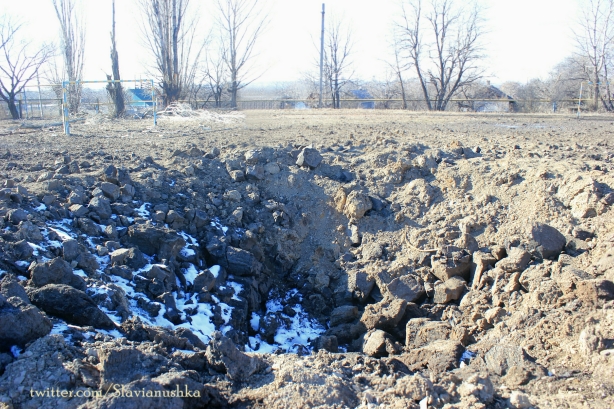
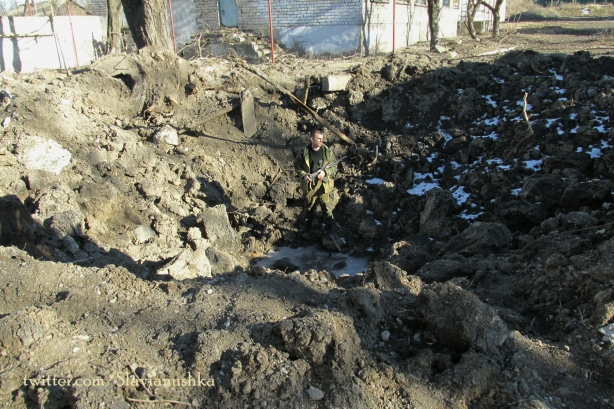
A third missile evidently reached the building.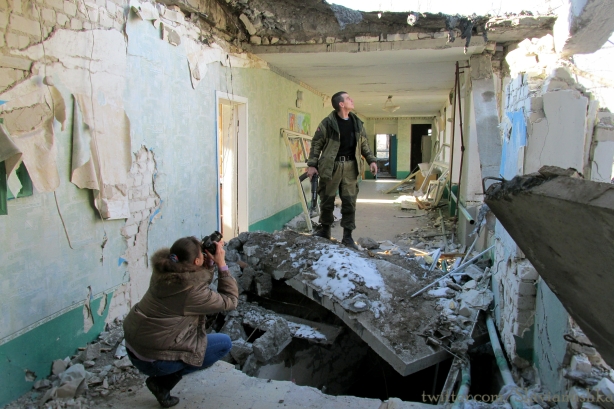
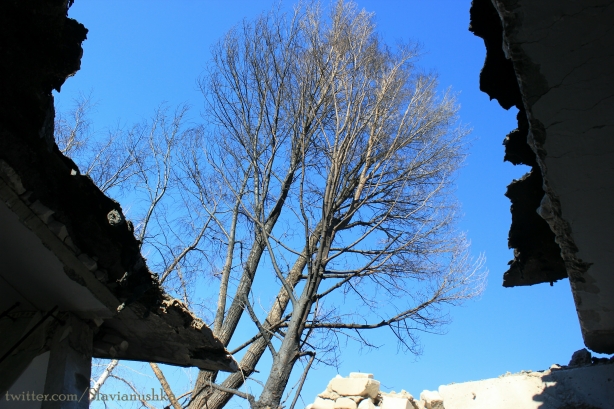
We found quite a large shell fragment, resembling a crumpled aluminium pail, inside the building, but the distinct marking number it bore proved that it was part of an Uragan missile.
Photos and video footage by Olga Luzanova
Article edited by @GBabeuf
The Acting Commander of the Perevalsk Command offered me a short tour of a little town which just happened to be in the immediate vicinity of the front-line. The Ukrainian forces had been firing towards the residential district of the town right up until the day when the Militia had mopped up Debaltsevo. We took the road which I knew very well. We drove through the town where I could see the consequences of the shelling all around. We approached the school from its rear and saw there a football pitch with a huge crater in the middle of it. Then we saw another crater from an Uragan missile near the school.


A third missile evidently reached the building.


We found quite a large shell fragment, resembling a crumpled aluminium pail, inside the building, but the distinct marking number it bore proved that it was part of an Uragan missile.
The school had not a single window left intact on the side facing towards Debaltsevo. Evidently, it had not been random fire—we could see that all the strikes on the school were direct hits.
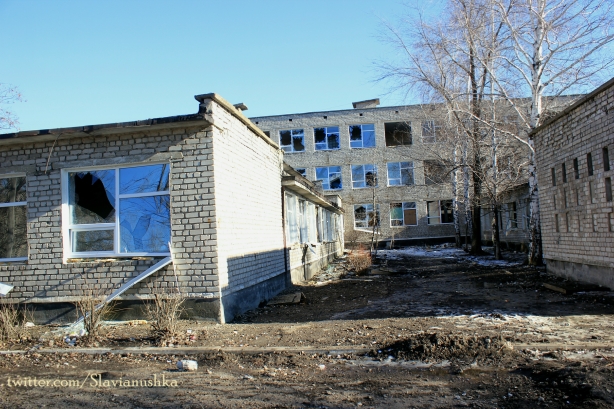
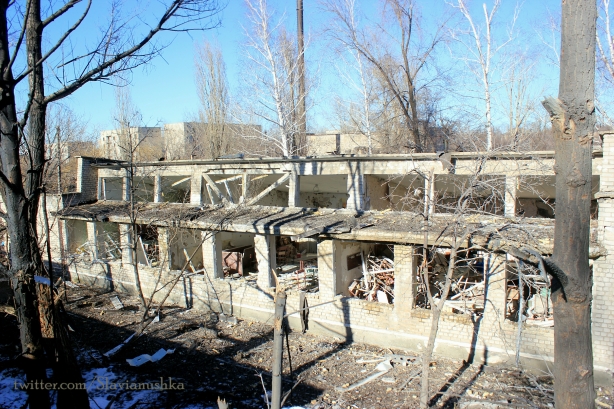
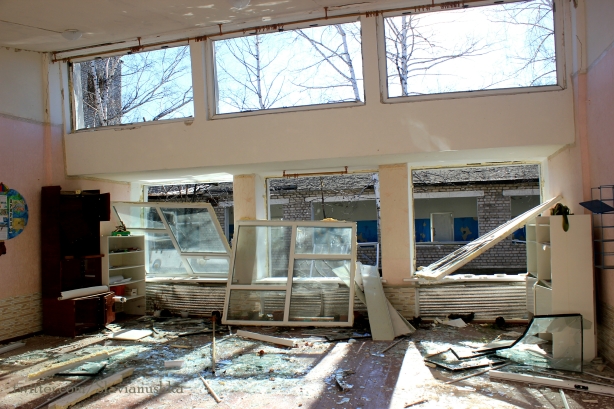
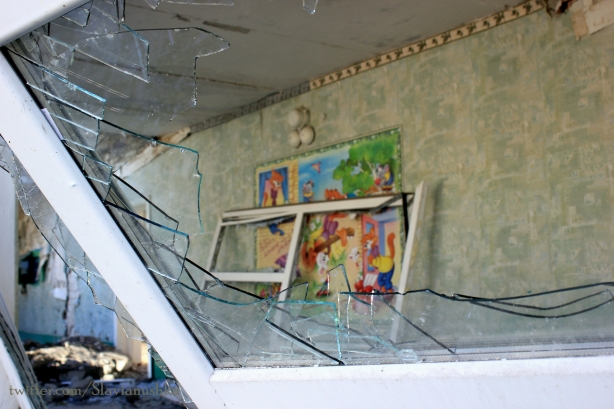
We walked round the school—its façade, which faced the direction of territory controlled by the Militia, remained almost undamaged. Incidentally, this school used to be one of the most beautiful in the Perevalsk region: it had won a grant for renovation two years ago and was then completely refurbished.




We walked round the school—its façade, which faced the direction of territory controlled by the Militia, remained almost undamaged. Incidentally, this school used to be one of the most beautiful in the Perevalsk region: it had won a grant for renovation two years ago and was then completely refurbished.
Now, the image of the book with hammer and sickle and the engraved phrase “Peace to the World” adds more sadness to the whole scene.
The condition of the building inside was no less terrible: overthrown pieces of furniture, broken window frames. splinters of glass and crumbled plaster on the floor, fragments of wood and brick everywhere, everything slashed and holed.
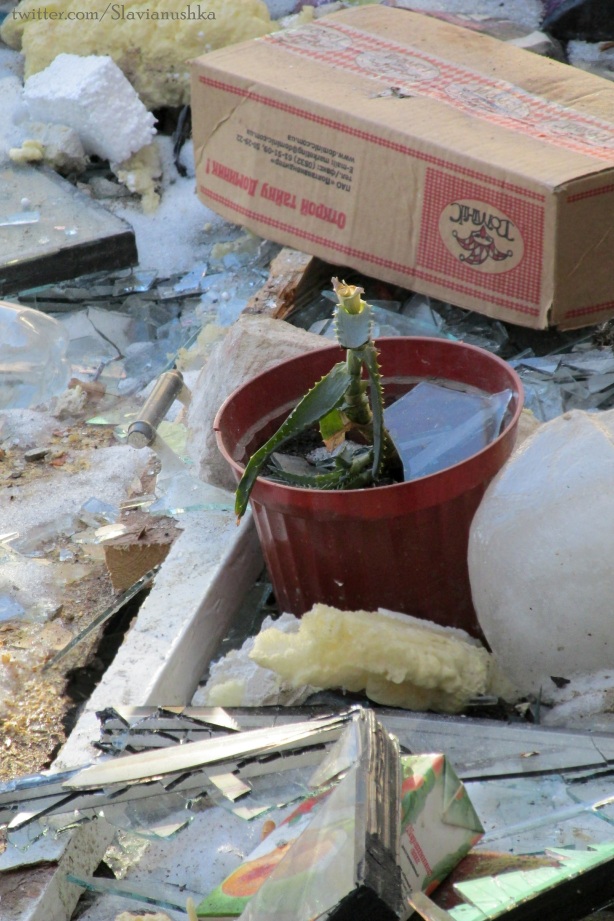
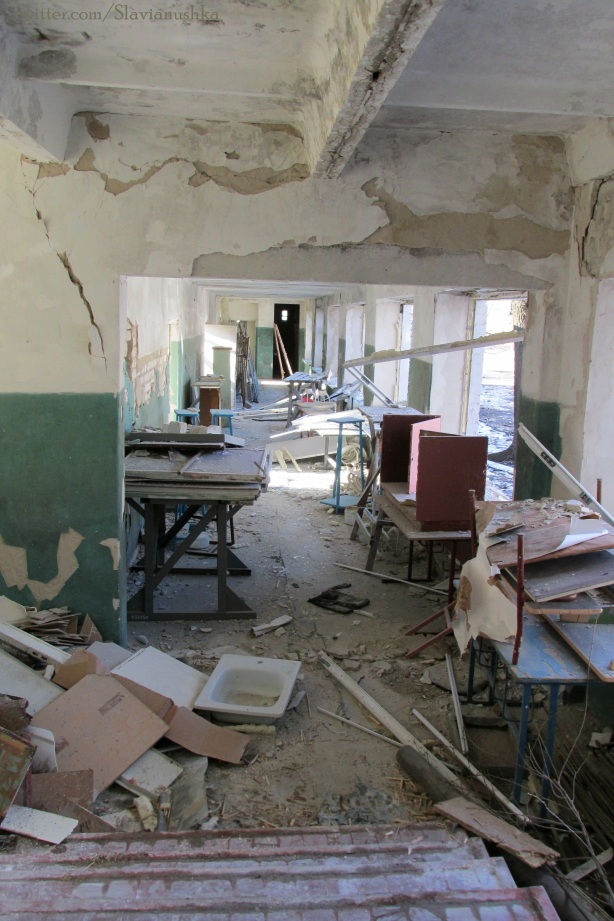
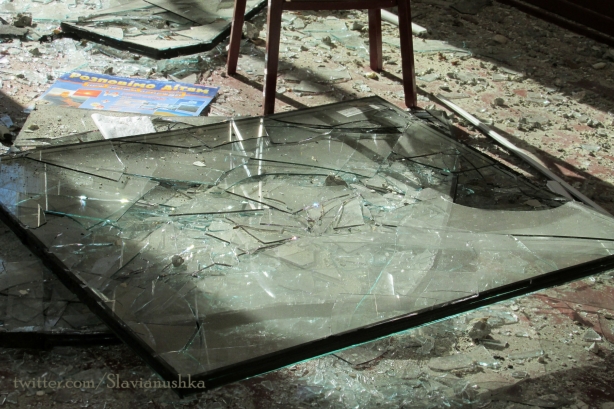
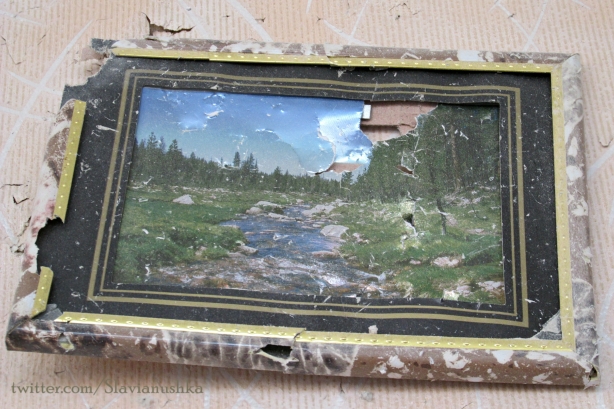
In a half-ruined corridor there were stands with portraits of the Heroes of the Great Patriotic War, “killed” once again by Ukrainian bullets. “Nobody has been forgotten, nothing has been forgotten.”




In a half-ruined corridor there were stands with portraits of the Heroes of the Great Patriotic War, “killed” once again by Ukrainian bullets. “Nobody has been forgotten, nothing has been forgotten.”
I should like to note that respect to the values of memory has always been a very important part of our school education. In the light of Ukraine’s conflict, one of the main tools currently employed in Ukrainian schools is the misrepresentation of history—in particular, replacing the names of Soviet heroes with the names of Banderites. Yet people in Donbass do remember their true history: we learned it not only at school, but also from our grandparents, who saw this history with their own eyes and retold it to us again and again, and we shall never forget it.
I heard a child’s voice outside—a little girl was coming up with a few adults, pointing in the direction of the worst damaged part of the school, saying: “My class was there.” Seven year old Vika was very sad about her school; almost all her friends have left the town, and now, she and her family may have to leave too:
I entered the classroom where Vika and the other first form pupils used to study. Again, the usual scene: pieces of broken glass everywhere, destroyed windows, smashed furniture, holed walls… Books left in a bookcase…
I entered the classroom where Vika and the other first form pupils used to study. Again, the usual scene: pieces of broken glass everywhere, destroyed windows, smashed furniture, holed walls… Books left in a bookcase…
Someone had written on the blackboard “Death to the fascist invaders.”
Donbass children don’t go to school…



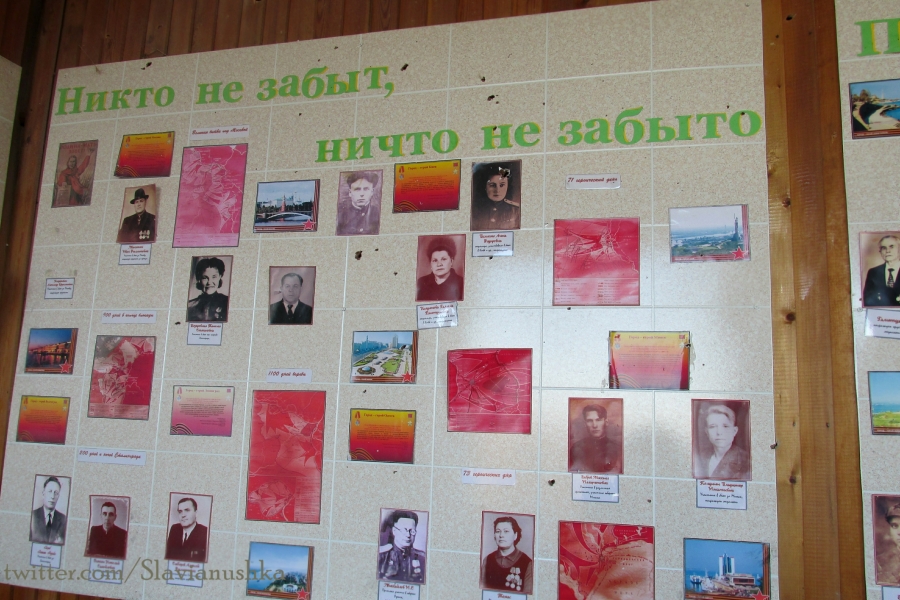
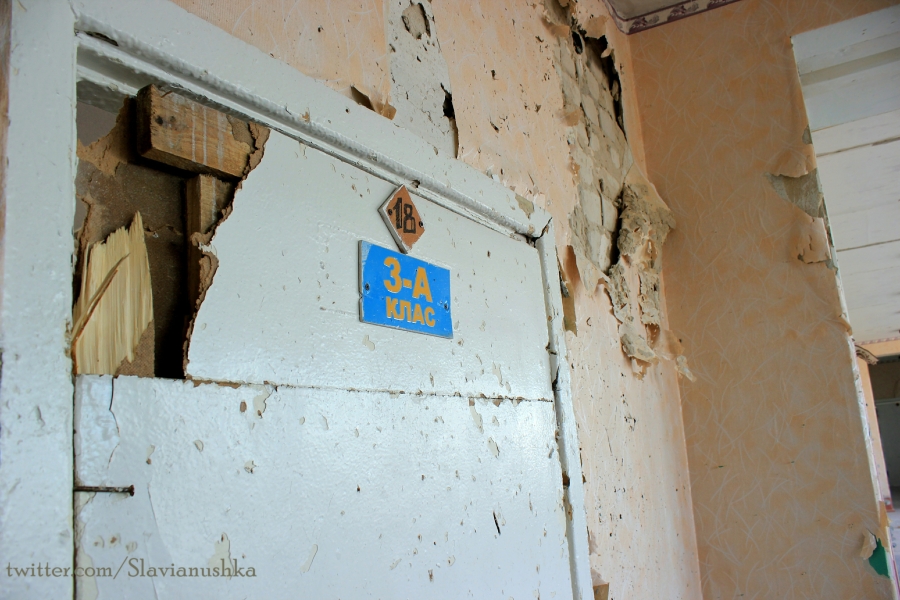

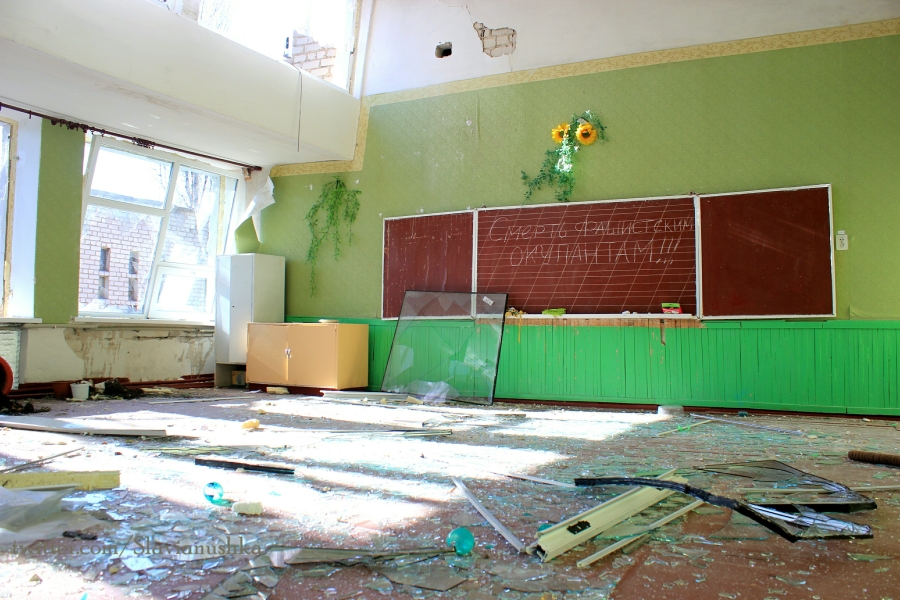
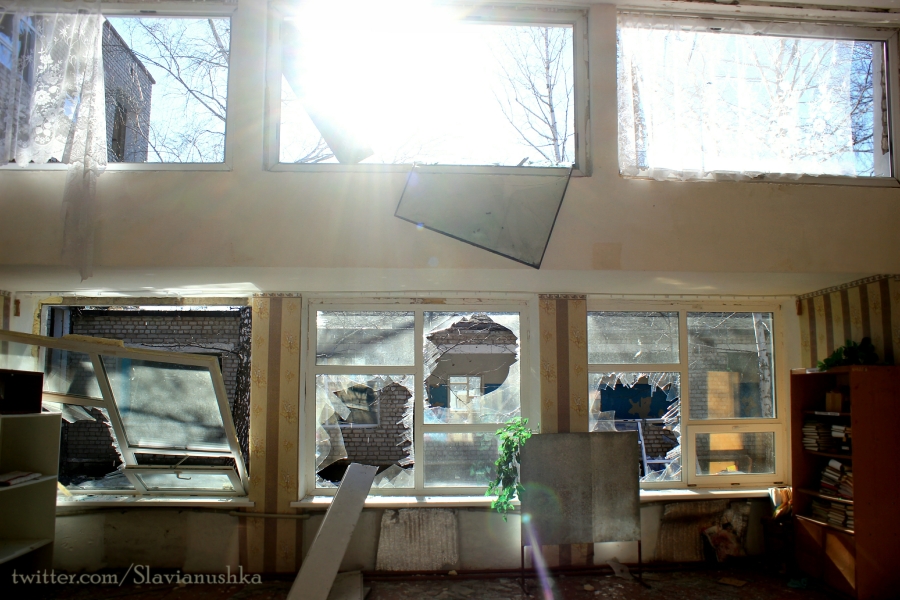
No comments:
Post a Comment